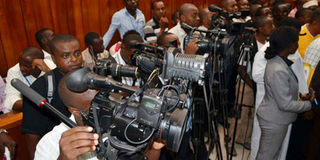A winning formula to rid local media of political bias

Television cameramen at work at the High Court in Mombasa on October 15, 2014. PHOTO | KEVIN ODIT | NATION MEDIA GROUP
What you need to know:
Journalists who publicly profess Islam, Hindu, Christianity or any other religion discernible by their own name must leave the newsroom.
Journalists can finally rest assured that they will be treated with the same respect as architects, engineers, lawyers, doctors and accountants, who have long established standards on being politically impartial.
Bias in the media poses the gravest danger to the credibility, fairness and freeness of the 2017 General Election. It outranks violence, vote-rigging and bad election management, hence the focus of the Media Council of Kenya on ensuring the impartiality of journalists.
Journalists who think they can dabble in politics should be forced out of the profession to see how they fare against seasoned professionals, whose lips are dripping with invective, and minds packed with bristling shards of brilliance.
The Media Council’s decree that journalists who have declared their intent to contest next year’s elections leave their jobs will clean the profession of quacks and masqueraders. These pretenders are the greatest threat to freedom of the media in Kenya, far behind death by poisoning, gunshots or being disappeared, among other acts of normal thuggery.
Journalists may watch politics, report it and talk about it, but they should never fall prey to the delusion that they can dabble in the game. Politics is a contagion that has strangled the talents of professional surgeons, blunted the edge of legal acumen and suffocated actuarial skill, turning erstwhile honest professionals into caricatures of their former selves. Journalism must not be allowed to fall.
POLITICAL PERSUASIONS
The abysmal standards in Kenya’s media are down to one thing: the naked political persuasions of reporters and their editors. Politics is responsible for the bad grammar on television, poor elocution on radio and atrocious spelling in newspapers, if not worse.
Journalism is far more dangerous than law, medicine, architecture and accounting combined. That is why those accredited to practice it can no longer continue in their profession, unlike doctors, lawyers and accountants, when there is a risk of contamination from politics.
Having scoured the breadth and depth of communication theory and examined the history of professional practice, the Media Council has no choice but to ban political activity by journalists. Journalists’ employers, who have previously exposed their own political biases by endorsing candidates, cannot be trusted to address breaches of impartiality.
Although impartiality is mentioned only once in the Code of Conduct for the Practice of Journalism in Kenya, it is at the heart of the law that the Media Council must enforce. Innocent Kenyan newspaper readers, radio listeners and television viewers are daily dragged out of their politically neutral corner by journalists pushing an agenda.
ONLY REASON
Lack of impartiality is the only reason elections are never free or fair in Kenya, and reportage less than satisfactory. Minor issues like experienced journalists leaving the newsroom too soon too frequently; corporate persuasion and staff selection bear no blame.
All Kenyans have a right to exercise political choices, but journalists must camouflage their political preferences if they plan to remain in practice. After all, journalists are not civil servants who are required to resign their offices only six months before the election if they plan to vie for seats. Unlike journalists, Cabinet secretaries, principal secretaries, teachers, police officers, heads of government agencies and chiefs of state-owned enterprises can more easily camouflage their political persuasion before taking the plunge into politics. Sans the accreditation from the Media Council, and bereft of a pay-slip, disgraced politically affiliated journalists will no longer be able to propagate their partisan views on social media, especially Facebook and WhatsApp.
After the impartiality purge, journalists who are openly associated with a religion should also have their accreditation withdrawn. Journalists who publicly profess Islam, Hindu, Christianity or any other religion discernible by their own name must leave the newsroom.
Journalists can finally rest assured that they will be treated with the same respect as architects, engineers, lawyers, doctors and accountants, who have long established standards on being politically impartial.





